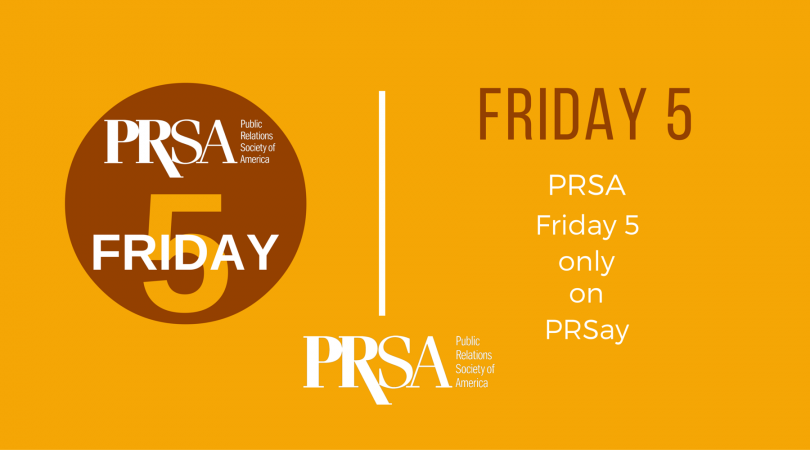If “reading, writing and arithmetic” are truly the basis for a child’s education, then why can writing often be so difficult, even for communication professionals? For public relations practitioners, writing is ingrained into every one of our tasks and tactics. It is our duty to stay well-informed of language and style changes made by the Associated Press and dictionary companies like Merriam-Webster. It is also imperative that we learn from our mistakes and find ways to make any criticisms of the work that we do into something constructive.
In this week’s PRSA “Friday Five”– an analysis of the week’s biggest public relations and business news and commentary – we look at a study about how readers interact with newspaper content, Merriam-Webster’s new words for 2014, constructive criticisms of public relations writing and tips for proofreading your own work. We’ll also take a look at what some consider an important disconnect between journalism school professors and journalists.
(Unsurprising) STUDY: We Don’t Read Newspapers Like We Used To (PRNewser)
The Newspaper Association of America (NAA) released a study that explores how readers access and interaction with newspaper media content has changed. The author of the article noted that the study has come years after most of these trends were originally reporter. However, some interesting facts surfaced nonetheless:
- The average adult uses four different devices or technologies to access news in a given week
- In 2014, online newspaper content reached more than 145 million unique visitors in January.
- In 2013, the Washington Post and The New York Times (only) drove more than 260,000 tweets of content each week.
Visit the article to view a fascinating infographic created by the NAA to accompany the study.
Hashtag, Selfie, Unfriend: the New Words of 2014 (The Wall Street Journal’s Digits Blog)
Merriam-Webster updated its 11th edition with some new words that may surprise you. How do they decide which new words make the cut? Peter Sokolowski, editor at large for Merriam-Webster said, “We take a census of language on a continuing basis. Then we take stock of which of those words are not in the dictionary and of those, which are being used with increasing frequency and with a wide distribution of publications.”
Some new words for this year include:
- big data
- gamification
- hashtag
- selfie
- tweeple
- unfriend
Did your favorite faux word make the cut? Visit the article to see the full list. Do you want to suggest a word for next year? Let Merriam-Webster know on Twitter using the hashtag #MW2014NewWords.
Study: Journalists and instructors differ on most important skills (Ragan’s PR Daily)
According to a recent Poynter Institute study “The Core Skills for the Future of Journalism” most journalism school professors think multimedia and digital storytelling skills are more important than actual journalists think they are. Why the disconnect? The author of the article believes “it could have something to do with the fact that newsrooms believe that they can teach multimedia on the fly, but they can’t teach the basics of storytelling.”
What do the journalists and professors agree upon? “A full 99 percent of professionals and educators ranked accuracy as the top skill a journalist must possess.” Read more about the study via the article.
9 Common Constructive Criticisms of PR Writing (PR News)
PR News recently asked their readers this question: What’s the most constructive suggestion you’ve ever received about your own PR writing? Here’s a preview of some of their answers:
- Make your writing engaging; have a conversation with people.
- Find a balance between bragging about a client or brand and stating accomplishments that add credibility.
- The humble reminder is to think in terms of hard news. Think like a journalist, not a salesperson.
- Keep your writing short, sweet and to the point. Don’t write in flowery language or like you are writing an essay.
See the full list by visiting the article.
5 Easy Tips for Proofreading Your Own Work (PRNewser)
While we can all agree that having a trusted colleague edit our work is a great option, sometimes you’ll only be able to rely on yourself when the need to proofread your copy before sending it to a member of the media or a client pops up. Often when reading the copy we wrote ourselves, typos and errors get overlooked. In order to prevent this from happening, the author offered the following tips:
- Change your scenery
- Know your weaknesses
- Take a break
View the full list by visiting the article.







